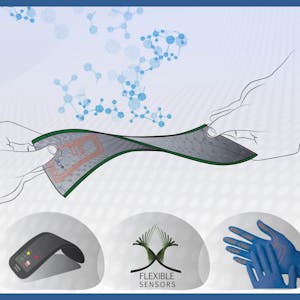Embark on a journey into the world of nanotechnology and nanosensors with the Nanotechnology and Nanosensors, Part 2 course. This interdisciplinary program delves into the utilization of nanotechnology for screening, detecting, and monitoring various events in personal and professional life. Through a series of engaging modules, you'll explore the fundamental principles behind nanotechnology and nanomaterials, their vital role in novel sensing properties and applications, and the fabrication, characterization, and manipulation of nanomaterials and nanosensors.
Guided by a team of experts, you'll gain in-depth knowledge about nanowire-based sensors, carbon nanotube-based sensors, sensors based on metal oxide and polymeric nanostructures, and electronic skin based on nanotechnology. With a focus on enhancing critical, creative, and innovative thinking, this course encourages multicultural group work and the development of new ideas through international collaboration.
Whether you're interested in disease diagnosis, quality control of goods, environmental monitoring, or security issues, this course equips you with the knowledge and skills to innovate and contribute to the advancements in nanotechnology and nanosensors.
Certificate Available ✔
Get Started / More Info
Delve into the world of nanotechnology and nanosensors through engaging modules. Explore nanowire-based sensors, carbon nanotube-based sensors, metal oxide sensors, polymeric nanostructures, and electronic skin based on nanotechnology.
The Nanowire-based Sensors module introduces you to the definition, properties, fabrication, and sensing applications of nanowires. You'll explore their role in gas sensing applications and gain insights into the diverse range of nanowire-based sensors. This module lays the foundation for understanding the innovative applications of nanowire-based sensors in various fields.
Explore the structure, properties, fabrication, and sensing applications of carbon nanotubes in the Carbon Nanotube-based Sensors module. Delve into their role in gas sensing applications and gain a comprehensive understanding of carbon nanotube-based sensors. This module equips you with the knowledge to leverage carbon nanotubes for innovative sensing tools.
The Sensors based on Nanostructures of Metal Oxide module covers the production, classification, and sensing mechanisms for metal oxide nanostructures. Discover the improvements in sensitivity for metal oxide sensors and engage in a peer review open-ended assignment to apply your knowledge. This module offers in-depth insights into the diverse applications of metal oxide sensors.
Embark on a journey into the properties, synthesis, and applications of polymeric nanostructures in the Sensors based on Polymeric Nanostructures module. Explore their role in gas sensing applications and gain a comprehensive understanding of polymeric nanostructure sensors. This module provides a solid foundation for leveraging polymeric nanostructures in sensing tools.
Discover the properties of the human skin and future applications for electronic skin in the Electronic Skin Based on Nanotechnology module. Explore electronic skin based on nanowires, field effect transistors, gold nanoparticles, and carbon nanotubes. Engage in a peer review final project to apply your knowledge and contribute to the advancements in electronic skin based on nanotechnology.
The Beer Quality Specialization offers brewers an in-depth understanding of key markers of beer quality, guided by expert Charlie Bamforth.
Explore the fascinating world of Gastronomic Engineering in this course from Pontificia Universidad Católica de Chile. Gain insights into the scientific and engineering...
Introduction to Molecular Spectroscopy provides an in-depth exploration of UV/Visible, Infrared, and NMR spectroscopies, complemented by interactive presentations,...
Transferencia de momentum, calor y masa computacional es un MOOC que desarrolla competencias de computación científica y métodos numéricos para resolver problemas...